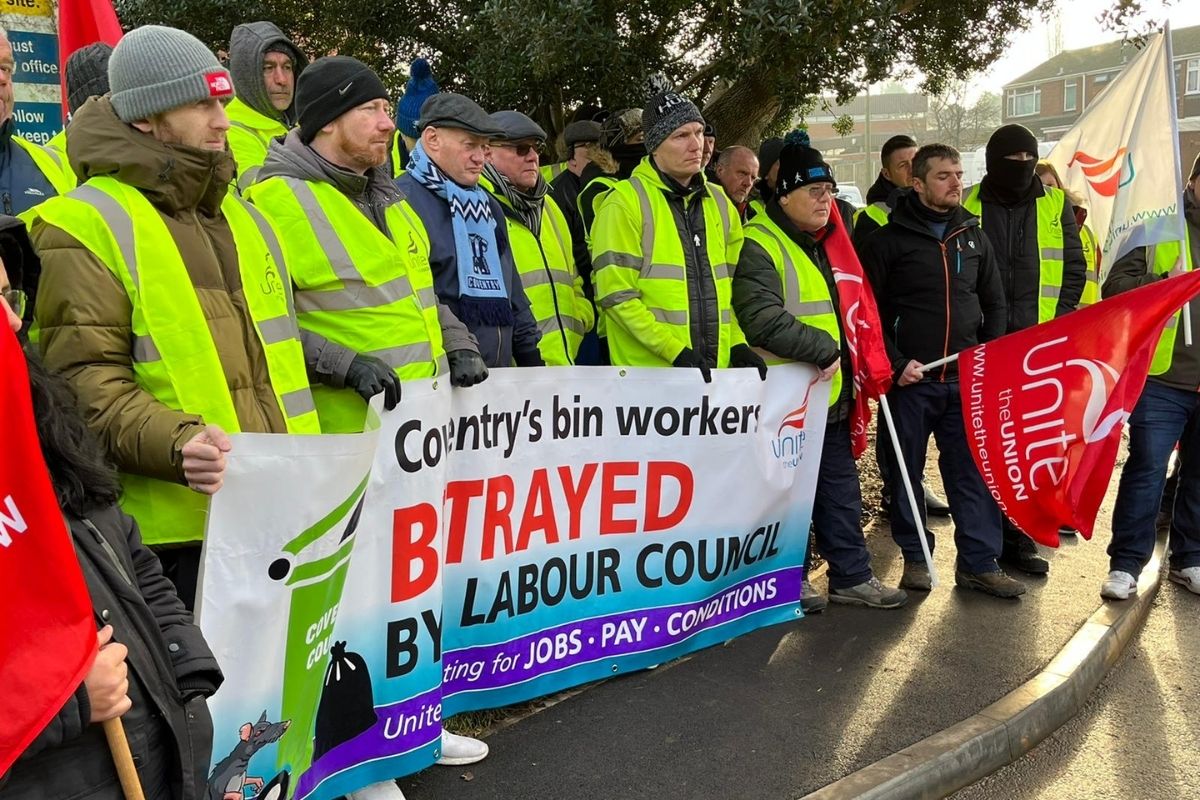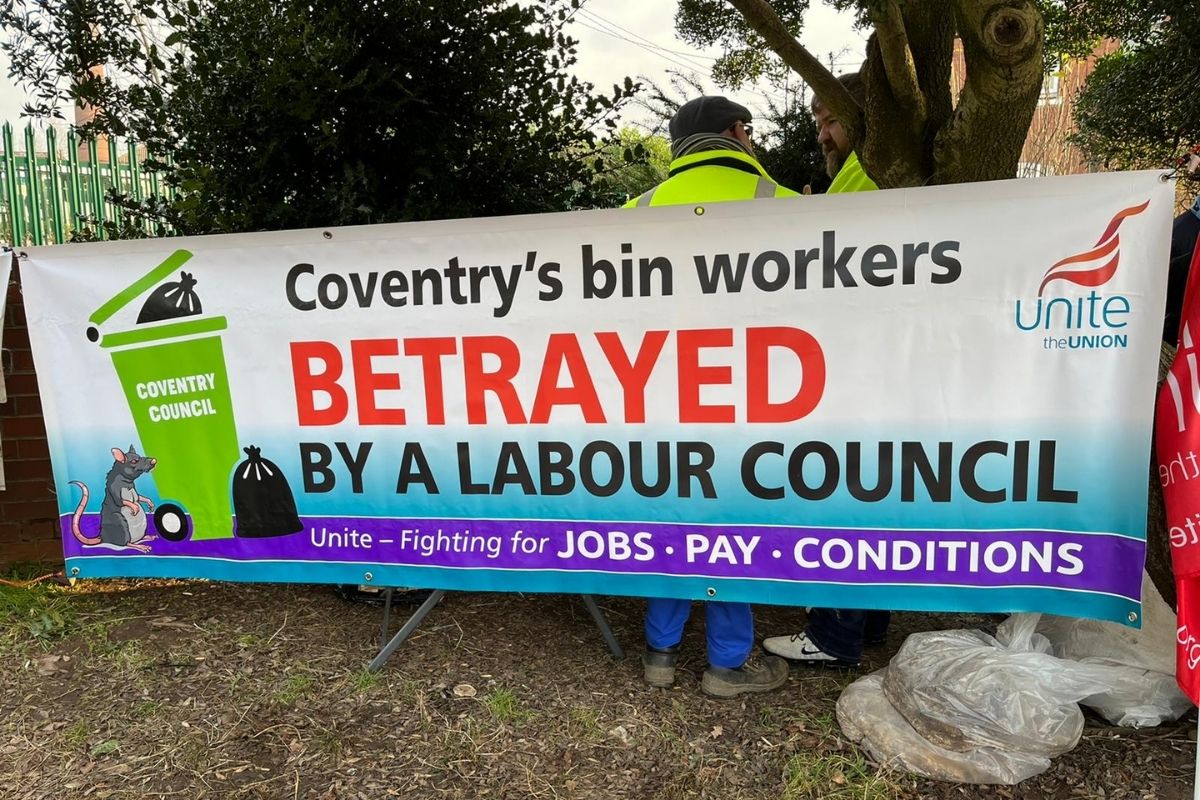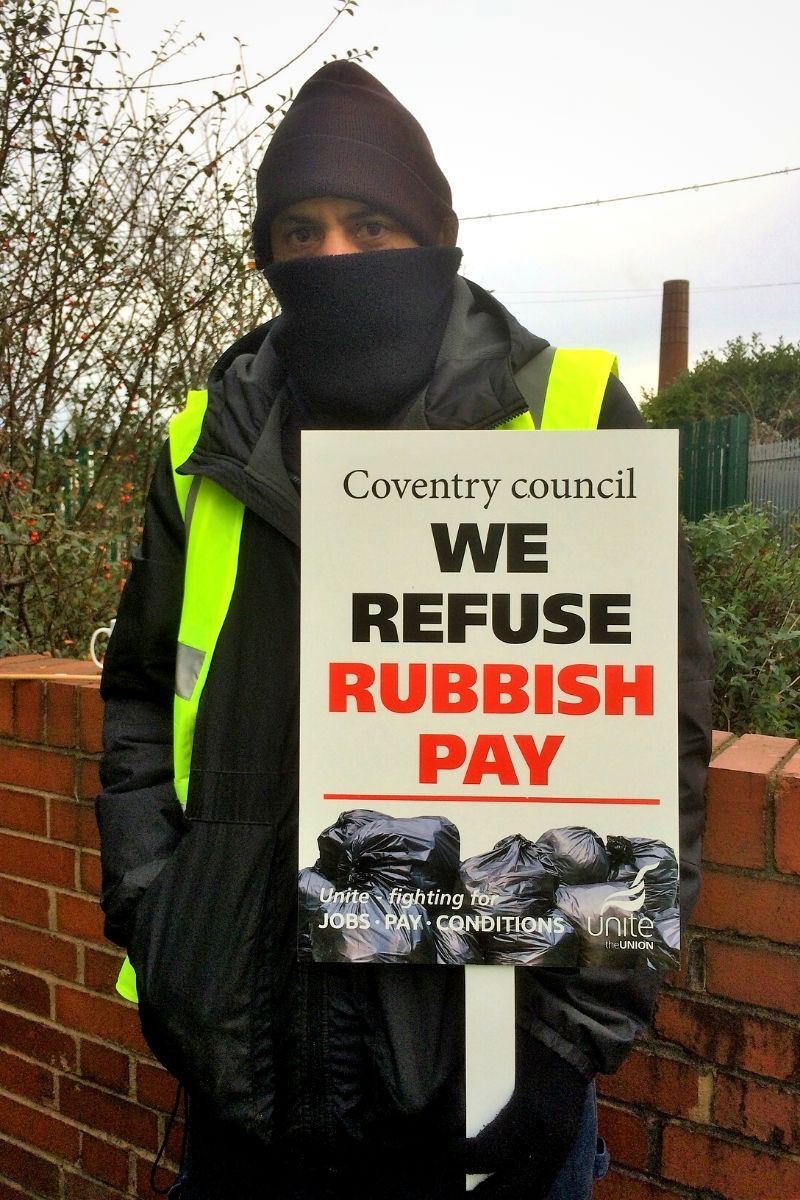Refuse workers in Coventry are escalating their struggle over pay. Despite facing stubborn opposition from their employers, the city council, the strikers remain determined to win. A victory here would be an inspiration for workers everywhere.
Last December, refuse collection drivers working for Coventry city council – organised in Unite the Union – voted overwhelmingly in support of industrial action, with a 98.5% majority on a turnout of over 90%. The main issue at stake is the poor pay afforded to the drivers.
Following this successful vote, since 5 January, the drivers have been engaged in strikes in an effort to have their voices heard and their wages raised to a liveable standard.
Employers’ antics
The council has proactively undermined the strikers’ struggle for better pay – for example, by opening at least nine temporary bin drop-off sites across the city, which have been used by over 34,000 residents.
In order to make these sites accessible, the council has sunk thousands of pounds into making modifications and laying tarmac.

These sites have also been staffed by agency labour, working seven days a week, who are paid £14 an hour on weekdays, and £28 an hour on weekends. Meanwhile, the average hourly rate for the striking refuse drivers comes in just above £11 an hour.
Rubbing further salt into the wound, some Labour councillors claimed that they did not know that there had been adverts for new drivers for a wholly-owned council service, called Tom White Waste Ltd.
This service employs (non-unionised) workers on inferior wages, terms, and conditions. These recent adverts, however, were for drivers on temporary contracts of a few months, on rates of £18-26 per hour – far above the current wages of striking refuse workers.
If the council simply paid these wages to the strikers, they would be happy to return to work! But instead we see the council feigning ignorance, and trying to break the strike – all at the added cost of bringing in these new drivers.
On top of this, the temporary drivers will need bin collectors to bring the bins to the lorries. But if these collectors refuse to work with these strike-breakers, they could be sacked.
In light of this, the bin collectors are holding a mass meeting, with the possible outcome that they too will come out on strike, alongside the drivers. This would escalate the dispute, hardening the attitude amongst the workers towards their employers.
In short: the council has shown that it is willing to throw money out of the window in order to keep the refuse drivers on poverty wages. At the same time, rubbish is visibly starting to pile up across the so-called ‘City of Culture’.
Increased militancy
Despite the council’s antics, morale remains high amongst the strikers, and the workers are determined to continue and intensify their fight in order to win.
The drivers have voted to begin an all-out strike, starting on 31 January, if their demands are not met before this date. Given the bullying actions and intransigent attitude of the city council, this seems likely.
The drivers are also beginning an information drive to counteract the disinformation about wages coming from the council’s officers. This drive will include using social media, as well as leafleting the public in the city centre and in the areas where Labour councillors live.
Overwhelming solidarity has been seen from across the labour movement – both at a local and a national level.
This support includes donations from Coventry TUC and Coventry Unite Tom Mann branch, as well as visits to the picket line by a delegation from Birmingham TUC.
The original position taken by the Labour councillors had been to remain silent. They claimed that the conflict should remain strictly between Unite the Union and the council officers, as the employers.
The councillors admitted that they were acting, in this respect, under legal advice; possibly from the guidance that emerged after the Nolan report into standards of behaviour, which stated:
“Holders of public office must avoid placing themselves under any obligation to people or organisations that might try inappropriately to influence them in their work.”
The councillors remained tightlipped on the matter until the end of the third week of strike action, when council leader George Duggins discussed the dispute on local radio. When asked if the council would resort to ‘fire and rehire’ if the dispute could not be resolved, Duggins did not answer.
Due to the council’s stubborn stance, the stage is now set for a long, drawn-out dispute. But Unite members on the picket lines are determined to see this through to the bitter end, knowing that a victory in this battle would provide inspiration for other council workers – in Coventry and across the country – who are facing similar attacks.
Fight the cuts! Fight for socialism!
Socialist Appeal activists are continuing to organise in support of the drivers and their militant struggle.
Importantly, the bin workers’ battle in Coventry is just one of many, with similar fights taking place recently in councils such as Bexley, Thurrock, Brighton, and Eastbourne. And many of these strikes have ended in victory for refuse workers, as a result of determined struggles by union members.
This shows the way forward for the Coventry refuse collection drivers – and for workers everywhere – in the fight against austerity, and to defend pay, jobs, and conditions.
The fact that such battles are so widespread also demonstrates that this is a generalised problem, not one unique to Coventry or anywhere else; the result of the deep crisis of capitalism, which is causing councils to cut to the bone, and to tender services to unscrupulous outsourcing companies such as Serco.
To fight back against these repeated cuts to councils and other public services across the country, therefore, the labour movement must link these struggles together and coordinate action across the trade unions – starting with a one-day public sector wide strike, as the start of a mass campaign to bring down this criminal Tory government.
This must be linked to the fight for a bold socialist programme, based on the nationalisation of the banks and monopolies, under democratic workers’ control. Only then can we guarantee quality public services, with decent pay and conditions for all.







